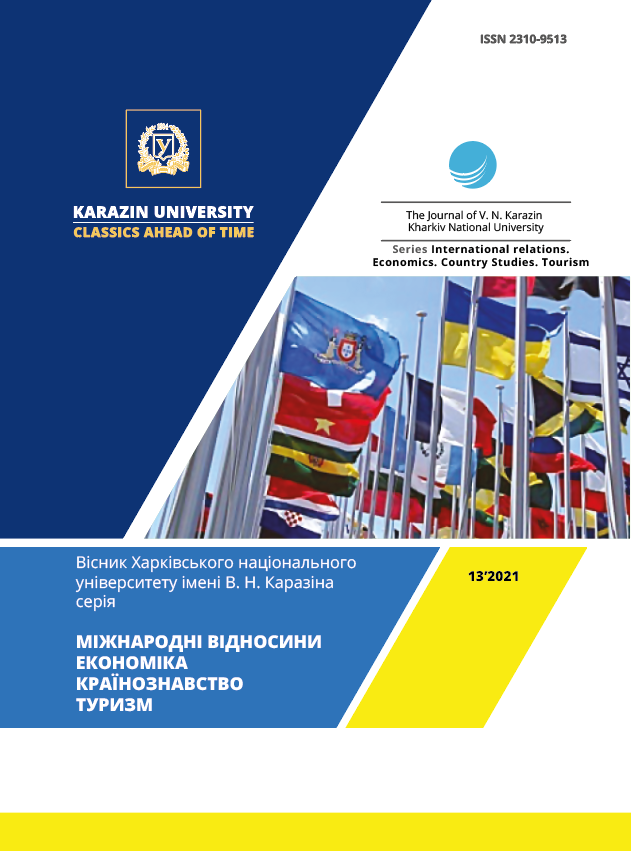Digital effects on macroeconomic stability in the framework of COVID-19 pandemic: EU practice
Abstract
The article deals with the investigation of the impact drivers on the gross domestic product as the main indicator of socio-economic development of the country in conditions of the COVID-19 pandemic. The subject of the research in the article is the indicators of macroeconomic stability of the EU and Non-UE countries. The purpose of the article is to assess interrelation between the GDP and destabilizing economic factors, for European Union and Non-EU countries, and – to define the role of digitalization in providing the country's economic growth. Tasks: to study the trends of indicators of macroeconomic stability of the country, to determine the role of digitalization in economic development, to conduct a comparative analysis of indicators of digitalization of the economy and macroeconomic stability of EU and Non-EU countries. General scientific used research methods: analysis - to analyze the main indicators of macroeconomic stability of countries and identify trends in their change under the influence of digitalization processes; methods of factor analysis - to find the factors that have the greatest impact on the indicators of macroeconomic stability of the country. The obtained results: the economic barriers affected by the pandemic were defined: dramatic falling of foreign direct investments; declining of cross-country trade volumes; global manufacturing output decreasing; unemployment rising, reductions in working time, temporary layoffs and job-search discouragement. Empirical estimations based on the correlation analysis allowed making the conclusions about: close inverse relationship between GDP, import, inflation rate; slight inverse relationship between GDP and FDI, unemployment rate, external debt, general governmental gross debt; little direct link between GDP and population, IMD World Digital Competitiveness rank.
Downloads
References
/References
Andrienko, O. E-commerce and Consumer Trends During Coronavirus. URL: https://www.semrush.com/blog/ecommerce-covid-19/;
Bhatti, A., Akram, H., Basit, H.M., Khan, A. U., Naqvi, S. M. R., Bilal, M. E-commerce trends during COVID-19 Pandemic. International Journal of Future Generation Communication and Networking. 2020, 13(2), 1449-1452.
Gao, X., Shi, X., Guo, H., Liu, Y. To buy or not buy food online: The impact of the COVID-19 epidemic on the adoption of e-commerce in China. PLoS ONE. 2020, 15(8). URL: https://journals.plos.org/plosone/article?id=10.1371/journal.pone.0237900
Pantelimon, F.-V., Georgescu, T. M., Posedaru, B.-S. The Impact of Mobile e-Commerce on GDP: A Comparative Analysis between Romania and Germany and how Covid-19 Influences the e-Commerce Activity Worldwide. Informatica Economica. 2020, 24(2), 27-41.
Nakhate, S. B., Jain, N. The Effect of Coronavirus on E-Commerce. Studies in Indian Place Names. 2020, 40(68), 516-518.
UNCTAD (2020). Covid-19 and E-commerce. Impact on businesses and policy responses. Retrieved URL: https://unctad.org/system/files/official-document/dtlstict2020d12_en.pdf
Tiutiunyk, I., Zolkover, A., Lyeonov, S., Kwilinski, A., Vysochyna, A., Kostornova, S. The Innovative financial technologies and its impact on shadow transactions. Socio-Economic Challenges. Proceedings of the International Scientific and Practical Conference. 2020, 422-425.
Humenna, Y. H., Tymoshenko, S. Merits and challenges of digital economy in developing countries. Proceedings from the International Scientific and Practical Conference on Socio-Economic Challenges. 2020, 436-439.
Tiutiunyk, I. V., Humenna, Yu. G. Financing of eco-oriented Projects: theory and practice. Managing economic growth: marketing, management, and innovations. Prague: Prague Institute for Qualification Enhancement. 2016, 428-440.
Боронос, В. Г., Карпенко, І. В. Моделювання макроекономічних індикаторів розвитку регіонів: оцінка рейтингу. Збірник тез доповідей 11-ї Всеукраїнської науково-практичної конференції «Статистична оцінка соціально-економічного розвитку» 2011, 143–146
International Monetary Fund. URL: https://www.imf.org/
IMD World Digital Competitiveness Ranking 2020. URL: IMD World Digital Competitiveness Ranking 2020
Andrienko, O. (2020). E-commerce and Consumer Trends During Coronavirus. URL: https://ww.semrush.com/blog/ecommerce-covid-19/;
Bhatti, A., Akram, H., Basit, H.M., Khan, A. U., Naqvi, S. M. R., Bilal, M. (2020). E-commerce trends during COVID-19 Pandemic. International Journal of Future Generation Communication and Networking, 13(2), 1449-1452.
Gao, X., Shi, X., Guo, H., Liu, Y. (2020). To buy or not buy food online: The impact of the COVID-19 epidemic on the adoption of e-commerce in China. PLoS ONE, 15(8). URL: https://journals.plos.org/plosone/article?id=10.1371/journal.pone.0237900
Pantelimon, F.-V., Georgescu, T. M., Posedaru, B.-S. (2020). The Impact of Mobile e-Commerce on GDP: A Comparative Analysis between Romania and Germany and how Covid-19 Influences the e-Commerce Activity Worldwide. Informatica Economica, 24 (2), 27-41.
Nakhate, S. B., Jain, N. (2020). The Effect of Coronavirus on E-Commerce. Studies in Indian Place Names, 40(68), 516-518.
UNCTAD (2020). Covid-19 and E-commerce. Impact on businesses and policy responses. URL: https://unctad.org/system/files/official-document/dtlstict2020d12_en.pdf
Tiutiunyk, I., Zolkover, A., Lyeonov, S., Kwilinski, A., Vysochyna, A., Kostornova, S. (2020). The Innovative financial technologies and its impact on shadow transactions. Socio-Economic Challenges. Proceedings of the International Scientific and Practical Conference, 422-425.
Humenna, Y. H., Tymoshenko, S. (2020). Merits and challenges of digital economy in developing countries. Proceedings from the International Scientific and Practical Conference on Socio-Economic Challenges, 436-439.
Tiutiunyk, I. V., Humenna, Yu. G. (2016). Financing of eco-oriented Projects: theory and practice. Managing economic growth: marketing, management, and innovations. Prague: Prague Institute for Qualification Enhancement, 428-440.
Boronos, V. G., Karpenko, І. V. (2011). Modeliuvannia makroekonomichnykh indykatoriv rozvytku rehioniv: otsinka reitynhu [Modeling of macroeconomic indicators of regional development: rating assessment]. Statistical assessment of socio-economic development: a collection of abstracts of the 11th All-Ukrainian scientific-practical conference, Khmelnytsky: Khmelnytsky University of Management and Law, 143–146
International Monetary Fund. URL:: https://www.imf.org/
IMD World Digital Competitiveness Ranking 2020. URL: IMD World Digital Competitiveness Ranking 2020
Authors who publish with this journal agree to the following terms:
- Authors retain copyright and grant the journal right of first publication of this work under the terms of a license Creative Commons Attribution License 4.0 International (CC BY 4.0).
- Authors are able to enter into separate, additional contractual arrangements for the non-exclusive distribution of the journal's published version of the work (e.g., post it to an institutional repository or publish it in a book), with an acknowledgement of its initial publication in this journal.
- Authors are permitted and encouraged to post their work online (e.g., in institutional repositories or on their website) prior to and during the submission process, as it can lead to productive exchanges, as well as earlier and greater citation of published work.




